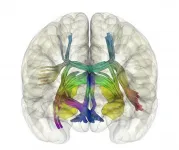(Press-News.org) In recent decades, Spain has undergone rapid social changes in terms of gender equality, despite, as a result of the Franco dictatorship, starting from a more backward position than most European countries. This process is hampered by the economic downturn that began in 2008, underlining the importance of the economic context in the development of gender inequality levels. Little attention has been paid in academia to how this gender revolution is associated with factors related to individual wellbeing.
A study by Jordi Gumà, a researcher at the Department of Political and Social Sciences and member of the UPF Sociodemography Research Group (DEMOSOC), together with Bruno Arpino, a researcher at the University of Florence (Italy), explores the association between the subjective level of satisfaction with life and the degree of relative participation by women and men in terms of providing financial resources to the household and performing domestic chores among the partnered adult Spanish population.
"When no financial difficulties are reported, it seems that gender behaviour in the home environment has less influence on individuals' levels of life satisfaction, whether men or women, than in homes with financial problems".
Following their research, published in Revista Internacional de Sociología, the researchers (who separate the analysis of the public and the private spheres to capture the effects differentially) conclude that the level of satisfaction with life is marked largely by household financial capacity: "When no financial difficulties are reported, it seems that gender behaviour in the home environment has less influence on individuals' levels of life satisfaction, whether men or women, than in homes with financial problems", the researchers assert.
Furthermore, the results reveal that there would be a situation of tension between the social context and inherited values (with an imbalance between gender values, far more egalitarian, and the end practices observed) would affect the levels of individual wellbeing.
The research methodology analyses Spanish samples from the European Social Survey (ESS) of 2004 and 2010 together, in which questions about family, work and wellbeing were introduced. The various analyses have been carried out independently according to sex, in order to identify possible differences between men and women. The sample was restricted to partnered individuals, within the 25-59 years age bracket.
The researchers state that the relative contribution to household income and the performance of household chores "has a significant effect on life satisfaction in the specific case of people with financial difficulties". This effect shows that the gender profile in households that report having financial difficulties is far closer to the traditional one. However, significant differences were found between men and women.
The overall situation of the household determines women's satisfaction
With regard to women, the researchers found that "their satisfaction with life is defined mainly by the overall situation of the household, beyond their own situation in terms of their relative contribution to income and relative time spent on household tasks". That is, it is their position within the private sphere that has the greatest impact on the values of life satisfaction in respect of women in Spain.
The position of women within the private sphere has the greatest impact on the values of life satisfaction in respect of women in Spain.
Among women who report not having financial difficulties (reaching the end of the month adequately or comfortably), the authors observe a positive relationship between their levels of satisfaction and time spent on household tasks: the greater their dedication, the higher their level of satisfaction. This pattern is exactly the opposite in the case of women who report having financial difficulties, whereby the greater their dedication to household tasks, the lower their satisfaction.
According to the researchers, one possible explanation is that more solvent households would be more able to hire paid services to perform household chores, so that although these women spend more time on household tasks than their partners, the actual number of hours allocated may be less than those who report having financial difficulties, and neither does this mean that there is parity with men. In fact, if we look at the average number of hours spent on such tasks, the figure is significantly lower among women with greater economic power.
Men's satisfaction with life is marked by their individual situation
In the case of men, the authors found significant differences in the level of satisfaction with regard to their relative contribution to the family budget. In the context of households with financial difficulties, men who report contributing more to total family income display higher levels of satisfaction than those who report contributing less than their partners.
According to the researchers, "being the main provider of material resources to the household is associated with values of satisfaction in the group of men in households with financial difficulties, while among men who report not having financial difficulties, being the main contributor does not seem to give them an extra boost to their levels of satisfaction".
In the context of households with financial difficulties, men who report contributing more to total family income display higher levels of satisfaction than those who report contributing less than their partners.
The same applies in the case of participation in household tasks, where significant differences were only observed, again, in men with financial difficulties, who reveal that devoting less time than their partners to household tasks is a situation associated with higher levels of satisfaction.
In consequence, according to the researchers, unlike the case of women, Spanish men's life satisfaction is determined to a greater extent by their individual situation, beyond the characteristics of the household as a whole. This suggests that, in this particular group of men, their position within the public sphere continues to set their perception of satisfaction with life.
INFORMATION:
Reference article: Gumà, J., Arpino, B. "Satisfacción con la vida según la contribución a la esfera pública y privada en las parejas españolas adultas". Revista Internacional de Sociología" (Life satisfaction according to contributions to public and private spheres among adult Spanish couples), vol. 79, no. 1 (2021).
DOI: https://doi.org/10.3989/ris.2021.79.1.19.045
The human world is, increasingly, an urban one -- and that means elevators. Hong Kong, the hometown of physicist Zhijie Feng (Boston University),* adds new elevators at the rate of roughly 1500 every year...making vertical transport an alluring topic for quantitative research.
"Just in the main building of my undergraduate university, Hong Kong University of Science and Technology," Feng reflects, "there are 37 elevators, all numbered so we can use them to indicate the location of hundreds of classrooms. There is always a line outside each elevator lobby, and if they are shut down, we have to hike for 30 minutes."
Feng and Santa Fe Institute Professor ...
Myotonic dystrophy is a hereditary degenerative neuromuscular disease that occurs mainly in adults, affecting about 50,000 people only in Spain. Symptoms range from difficulty walking and myotonia (great difficulty in relaxing the contracted muscles) to severe neurological problems, leading to progressive disability that unfortunately puts many of those affected in a wheelchair. This disease is very heterogeneous among patients (age of onset, progression, hereditary transmission, affected muscles), which makes the development of generic treatments especially complex.
Currently, drugs against myotonic ...
LAWRENCE -- Like much of society, college athletics were thrown into disarray by the COVID-19 pandemic. While student athletes were suddenly prevented from competing, training or seeing as much of their teammates and coaches, those who perceived they were part of a positive sporting environment also coped better during the early days of the crisis, a new study from the University of Kansas has found.
KU researchers have long studied a caring, task-involved sporting climate, in which young athletes receive support and recognition for their efforts, while mistakes are treated as learning opportunities. But the pandemic provided a unique opportunity to see whether the approach helped collegiate athletes cope with the unique stresses and challenges that came with the disruption ...
Social media may make it easier for people to engage online, but I does not provide certain benefits of real-life human interactions, says a Michigan State University researcher.
"Problematic social media use has been associated with depression, anxiety and social isolation, and having a good social support system helps insulate people from negative mental health," said Dar Meshi, an assistant professor in the Department of Advertising and Public Relations at MSU. "We wanted to compare the differences between real-life support and support provided over social media to see if the support provided over social media could have beneficial effects."
The research was published online April 29 in the journal Addictive Behaviors.
While ...
Living materials, which are made by housing biological cells within a non-living matrix, have gained popularity in recent years as scientists recognize that often the most robust materials are those that mimic nature.
For the first time, an international team of researchers from the University of Rochester and Delft University of Technology in the Netherlands used 3D printers and a novel bioprinting technique to print algae into living, photosynthetic materials that are tough and resilient. The material has a variety of applications in the energy, medical, and fashion sectors. The research is published in ...
Nearly 10,000 acres of lush seagrass vanished from Florida Bay between 1987 and 1991, leading to massive ecological changes in the region near the Florida Keys. Abundance of the seagrass, Thalassia testudinum, more commonly known as turtlegrass, a foundation species of the Florida Bay ecosystem, decreased extensively during what is considered to be one of the largest declines in seagrass cover in recent history.
Researchers from the University of South Florida, the Florida Fish and Wildlife Conservation Commission (FWC) and the University of North Carolina Wilmington documented the response of seagrasses after the die-off. ...
31 percent of pet dogs and 40 percent of pet cats tested positive to COVID-19 after their owners' own diagnoses, though under half displayed symptoms, in small Brazilian study.
INFORMATION:
Publicly available article: https://journals.plos.org/plosone/article?id=10.1371/journal.pone.0250853
Article Title: Investigation of SARS-CoV-2 infection in dogs and cats of humans diagnosed with COVID-19 in Rio de Janeiro, Brazil
Funding: MMS: This study was supported by CGLab/MoH (General Laboratories Coordination of Brazilian Ministry of Health), CVSLR/FIOCRUZ (Coordination of Health Surveillance and Reference Laboratories ...
Thanks to the so-called deep learning, a subset of artificial intelligence (AI) algorithms inspired by the brain, machines can match human performance in perception and language recognition and even outperform humans in certain tasks. But do these synthetic biologically inspired systems learn in the same way that we do?
According to a new article by first author Dr. Diogo Santos-Pata from the Synthetic Perceptive, Emotive and Cognitive Systems lab (SPECS) at IBEC led by ICREA Professor Paul Verschure, in collaboration with Prof. Ivan Soltesz at Stanford University, the mechanism of autonomous learning underlying these AI systems reflects nature more closely than previously thought. With their hypothesis and model, these scientists offer new insights into ...
A world first study within the Great Barrier Reef Marine Park has found limited fishing zones (yellow zones) are still important conservation and fisheries management tools when paired with no-fishing zones.
Lead author Dr April Hall, from the ARC Centre of Excellence for Coral Reef Studies at James Cook University (Coral CoE at JCU), said partially protected yellow zones still contain healthy numbers of reef fish targeted for recreational and commercial fishing. These include coral trout, tropical snappers, emperors and tuskfish.
Yellow zones limit, rather than prohibit, fishing through fishing gear restrictions. For example, limited line fishing is allowed with one rod or line and one hook per ...
Bowel cancer survival rates could be improved if chemotherapy drugs were delivered via tiny nanoparticles to the diseased organs rather than oral treatment.
That's the finding from Indian and Australian scientists who have undertaken the first study, using nanoparticles to target bowel cancer, the third most common cancer in the world and the second most deadliest.
The researchers have shown in animal experiments that nanoparticles containing the chemotherapy drug Capecitabine (CAP) attach themselves directly to the diseased cells, bypassing healthy cells and therefore reducing toxic side effects as well as the size and number of tumours.
The scientists, from the Manipal Academy of Higher Education, Indian Institute of Science and the University of South Australia, ...





